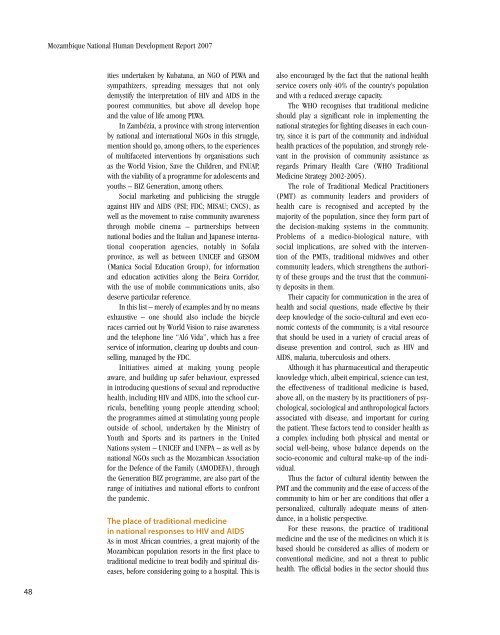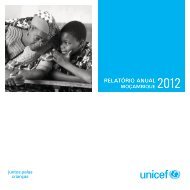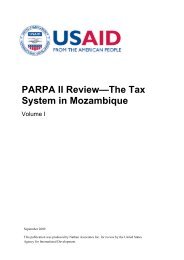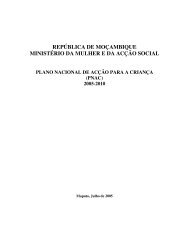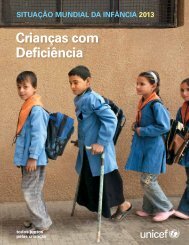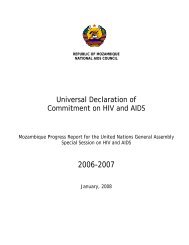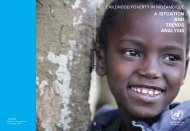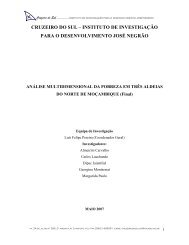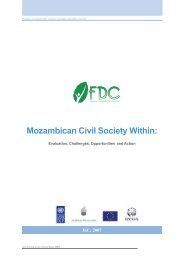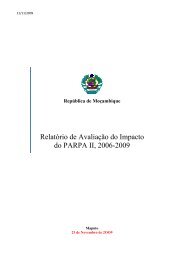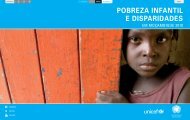English language version - Human Development Reports - United ...
English language version - Human Development Reports - United ...
English language version - Human Development Reports - United ...
- No tags were found...
You also want an ePaper? Increase the reach of your titles
YUMPU automatically turns print PDFs into web optimized ePapers that Google loves.
Mozambique National <strong>Human</strong> <strong>Development</strong> Report 2007ities undertaken by Kubatana, an NGO of PLWA andsympathizers, spreading messages that not onlydemystify the interpretation of HIV and AIDS in thepoorest communities, but above all develop hopeand the value of life among PLWA.In Zambézia, a province with strong interventionby national and international NGOs in this struggle,mention should go, among others, to the experiencesof multifaceted interventions by organisations suchas the World Vision, Save the Children, and FNUAP,with the viability of a programme for adolescents andyouths – BIZ Generation, among others.Social marketing and publicising the struggleagainst HIV and AIDS (PSI; FDC; MISAU; CNCS), aswell as the movement to raise community awarenessthrough mobile cinema – partnerships betweennational bodies and the Italian and Japanese internationalcooperation agencies, notably in Sofalaprovince, as well as between UNICEF and GESOM(Manica Social Education Group), for informationand education activities along the Beira Corridor,with the use of mobile communications units, alsodeserve particular reference.In this list – merely of examples and by no meansexhaustive – one should also include the bicycleraces carried out by World Vision to raise awarenessand the telephone line “Aló Vida”, which has a freeservice of information, clearing up doubts and counselling,managed by the FDC.Initiatives aimed at making young peopleaware, and building up safer behaviour, expressedin introducing questions of sexual and reproductivehealth, including HIV and AIDS, into the school curricula,benefiting young people attending school;the programmes aimed at stimulating young peopleoutside of school, undertaken by the Ministry ofYouth and Sports and its partners in the <strong>United</strong>Nations system – UNICEF and UNFPA – as well as bynational NGOs such as the Mozambican Associationfor the Defence of the Family (AMODEFA), throughthe Generation BIZ programme, are also part of therange of initiatives and national efforts to confrontthe pandemic.The place of traditional medicinein national responses to HIV and AIDSAs in most African countries, a great majority of theMozambican population resorts in the first place totraditional medicine to treat bodily and spiritual diseases,before considering going to a hospital. This isalso encouraged by the fact that the national healthservice covers only 40% of the country’s populationand with a reduced average capacity.The WHO recognises that traditional medicineshould play a significant role in implementing thenational strategies for fighting diseases in each country,since it is part of the community and individualhealth practices of the population, and strongly relevantin the provision of community assistance asregards Primary Health Care (WHO TraditionalMedicine Strategy 2002-2005).The role of Traditional Medical Practitioners(PMT) as community leaders and providers ofhealth care is recognised and accepted by themajority of the population, since they form part ofthe decision-making systems in the community.Problems of a medico-biological nature, withsocial implications, are solved with the interventionof the PMTs, traditional midwives and othercommunity leaders, which strengthens the authorityof these groups and the trust that the communitydeposits in them.Their capacity for communication in the area ofhealth and social questions, made effective by theirdeep knowledge of the socio-cultural and even economiccontexts of the community, is a vital resourcethat should be used in a variety of crucial areas ofdisease prevention and control, such as HIV andAIDS, malaria, tuberculosis and others.Although it has pharmaceutical and therapeuticknowledge which, albeit empirical, science can test,the effectiveness of traditional medicine is based,above all, on the mastery by its practitioners of psychological,sociological and anthropological factorsassociated with disease, and important for curingthe patient. These factors tend to consider health asa complex including both physical and mental orsocial well-being, whose balance depends on thesocio-economic and cultural make-up of the individual.Thus the factor of cultural identity between thePMT and the community and the ease of access of thecommunity to him or her are conditions that offer apersonalized, culturally adequate means of attendance,in a holistic perspective.For these reasons, the practice of traditionalmedicine and the use of the medicines on which it isbased should be considered as allies of modern orconventional medicine, and not a threat to publichealth. The official bodies in the sector should thus48


